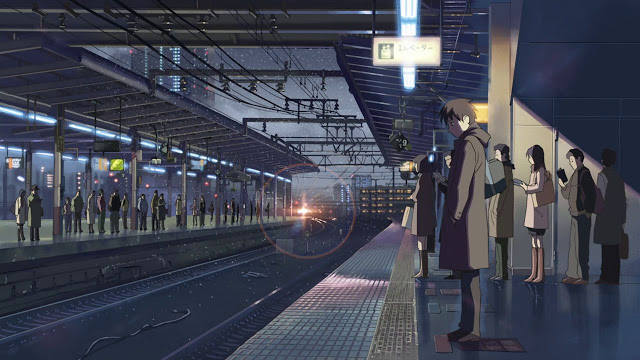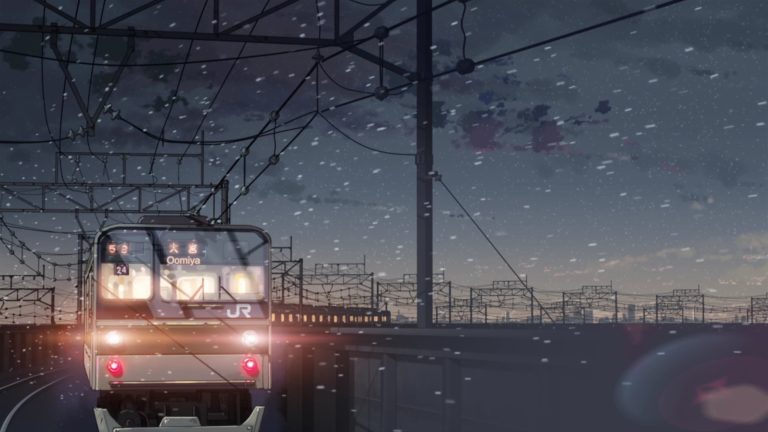sinkai (your name director) is obsessed with trains, he uses it in pretty much every anime. here:
quote:
When you first watch a Shinkai Makoto film, you might not realise just how much screen time is given to trains and train stations, both inside and out. But once you see it, you can√Ę‚ā¨‚ĄĘt un-see it. Makoto uses trains a lot in his films and it√Ę‚ā¨‚ĄĘs not because he√Ę‚ā¨‚ĄĘs a densha otaku. It√Ę‚ā¨‚ĄĘs because trains simultaneously symbolise separation and replicate a sense of the everyday that we are intimately familiar with.

Trains allow filmmakers to show separation of both time and space. When your loved one is on the opposite side of the country, the time it takes to reach them become unbearable. They highlight a sense of longing, waiting, and yearning. Time almost stands still on a long train journey. Boredom leads to wondering and dissatisfaction. Images hypnotically whizz past the window and suddenly you√Ę‚ā¨‚ĄĘre fantasising, fantasising about the object of your affection hopefully waiting at the end of your journey.
We see how trains make time torturous in √Ę‚ā¨Ňď5 Centimetres per Second√Ę‚ā¨¬Ě. Young loves Akari and Takaki are separated by hundreds of miles. She√Ę‚ā¨‚ĄĘs writing him love letters on the train. We see him asleep in his winter uniform, a reminder that they√Ę‚ā¨‚ĄĘve been apart since their love blossomed in spring. Seasons change. The only constant is that the two young loves are still separated.
Akari is telling Takaki that he wouldn√Ę‚ā¨‚ĄĘt recognise her if he saw her. That strikes a deep note. The lover√Ę‚ā¨‚ĄĘs anxiety that they will be forgotten. And, when you throw long distance at love, it√Ę‚ā¨‚ĄĘs not such an irrational fear. Like the cherry blossom falling at 5 centimetres per second, their love, just like the characters who feel it, is drifting further away bit by bit.
We already know it√Ę‚ā¨‚ĄĘs going to be a long journey when we see Takaki lay out all of the connecting trains he must take on his journey to Akari. But we soon discover that an already long and much-anticipated journey is about to become so long that time stands still.

Due to adverse weather, the train halts over and over again. With every halt, more time slips away. Each stop may only be 10 minutes in length but it increases and compounds the amount of time robbed from the two young loves. Like the falling snow, 5 centimetres per second may not seem like a lot when you√Ę‚ā¨‚ĄĘre close to the ground but what if the distance it could travel was indefinite?
The train fills Takaki√Ę‚ā¨‚ĄĘs whole world with light and noise and pain. It reminds us of the agonising sense of koi highlighted in Murakami√Ę‚ā¨‚ĄĘs short story, Concerning the Sound of a Train Whistle in the Night: √Ę‚ā¨ňúThe pressure is so intense,√Ę‚ā¨‚ĄĘ says the young lover in the story, using words that could equally come from Takaki. √Ę‚ā¨ňúIt makes my heart ache. I feel like I√Ę‚ā¨‚ĄĘm going to explode, to be torn in two √Ę‚ā¨‚Äú you know that feeling?√Ę‚ā¨‚ĄĘ The answer is yes, we do. We know exactly what it√Ę‚ā¨‚ĄĘs like when each minute feels like an eternity.
Trains are used in an equally powerful and symbolic way in √Ę‚ā¨ŇďThe Garden of Words√Ę‚ā¨¬Ě. Instead of symbolising time and distance, in this film, Makoto uses trains to evoke loneliness and contrast it with the love that blooms between Akizuki and Yukino.
In Japan, where even in the middle of Friday evening rush hour trains are deadly silent, the train is the perfect environment to observe this one truism: a crowd is the loneliest place to be.
You√Ę‚ā¨‚ĄĘre surrounded by all of these people who won√Ę‚ā¨‚ĄĘt meet your eyes and won√Ę‚ā¨‚ĄĘt talk to you and you can√Ę‚ā¨‚ĄĘt help but feel completely isolated, completely cut off from your fellow man.
__________________
It's now very common to hear people say, 'I'm rather offended by that.' As if that gives them certain rights. It's actually nothing more... than a whine. 'I find that offensive.' It has no meaning; it has no purpose; it has no reason to be respected as a phrase. 'I am offended by that.' Well, so loving what - Stephen Fry.

